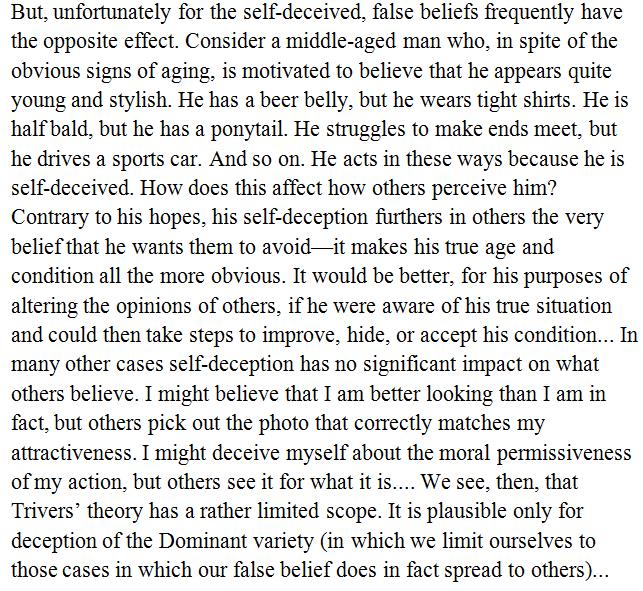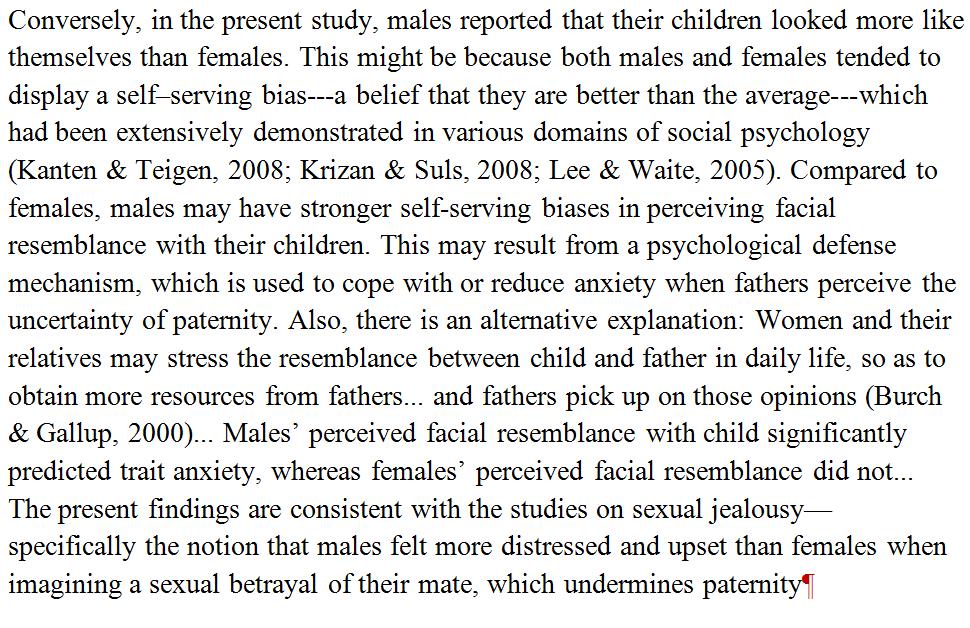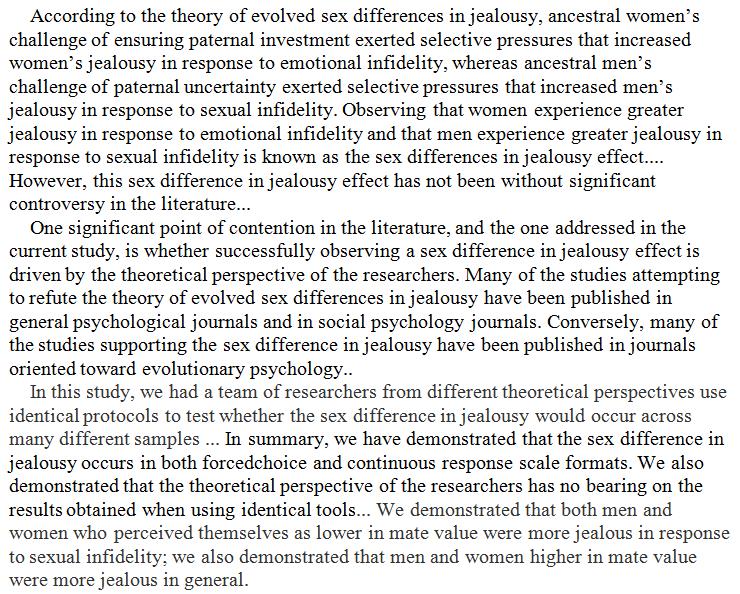MAYBE I'M NOT AS GREAT AS I THINK I AM. MAYBE I'VE DECEIVED MYSELF INTO THINKING THAT I'M MUCH BETTER THAN I REALLY AM. I DON'T KNOW.
Robert Trivers' argument that the primary function of self-deception is to better deceive others is seriously flawed http://link.springer.com/article/10.1007/s10539-016-9550-2 …

To explore deception and self-deception between the sexes at first contact, it is helpful to know that in humans, female choice usually focuses primarily on a male's status, resources, and willingness to invest as well as signs of genetic quality (especially when she's ovulating). The latter may be revealed by physical attractiveness (for example, facial symmetry and facial masculinity). So we expect males to misrepresent their standing on these attributes upward. They appear to have more to give than they actually do, they are more likely to give it than in fact they will, and their genes are better than they really are (this last one perhaps is the hardest to fake).
Given the large initial difference in parental investment - at its extreme, a sperm cell weighing one-trillionth of a gram and a nine-month pregnancy producing a seven-and-a-half-pound baby - it is hardly surprising that men (compared to women) place relatively greater emphasis on short-term mating relations than on long-term. This leads to a large and consistent psychological difference between the sexes regarding sex itself. Men all over the world show a greater preference for sexual variety than do women. Men desire more sexual partners over various time intervals, are more likely to consent to sex with an attractive stranger, have twice as many sexual fantasies per unit in time, and are more likely to seek out prostitutes and to lower their standards in choice of women for short-term relationships. Women more than men report being deceived about partner ambition, sincerity, kindness, and strength of feeling. Only in willingness to have sex are women seen as more deceptive than men - hardly surprising given men's interest in sex.
Likewise, there is a selection for females to simulate orgasm, but rarely a pressure (or necessity) for males to do likewise. Women fake orgasms to massage the male ego and to bring an end to unwanted sex. Some men are completely fooled, many probably at least some of the time. The real orgasm is assumed to act positively regarding sperm movement, that is, sucking it inside. It also makes future sex with the same partner more likely.
FOO
One of the most important issues for a man occurs nine months after a sexual act is said to produce a brand-new child, of which he is claimed to be the father. But is he? The difference is critical, related by 1/2 or related by 0. Sex all but guarantees maternity, of course, but it does not guarantee paternity. Men are expected to be especially likely to be concerned with problems of parentage, as indeed they are. How about our powers of perception? There appears to be no difference between the sexes in ability to recognize whether children are the offspring of a given parent, but both sexes more easily spot relatedness through the mother, and each is better at spotting relatedness when the baby is of their own sex. There is, however, a striking sex difference in attribution of relatedness to newborns - women and their relatives overwhelmingly comment on resemblance to the father (more so for sons than daughters) and, as expected, putative fathers may be both taken along and somewhat skeptical of the claimed resemblance. Experiments in which people's faces are morphed onto unrelated children so as to create an artificial resemblance show that men are affected by greater self-resemblance in claiming greater willingness to adopt, pay child support, forgive after something is broken, and so on - but women are not. Many societies have jokes on the subject. In Senegal: "Better to have an ugly baby who resembles you than a good looking one who resembles your neighbor." In Jamaica, to give a man a "jacket" is to father a child he takes as his own. The better the jacket fits (resembles him), the happier he will be. To "cut a man a waistcoat" is to produce a perfect mimic, since waistcoats have to be individually tailored to fit properly.

How can you know for sure that the child a woman carries is genetically your own? Of course, you can't. Some men torture themselves over the possibilities, the hours when she was not around, phone calls with old friends, whatever. But I always believed the issue was overrated, because I did not believe it was possible for me to look at a child for long and not be able (without DNA tests) to know whether it was my own. There are enough dominant genetic markers in my lineage that the truth must be there in front of my eyes. If that is really true, then we are talking at worst about nine months or so of wasted investment, a trivial cost, put to a good social purpose. Let us put the matter behind us and go on with the rest of our lives. In other words, we need not spiral off into the fatal land of jealousy, but that is alas all too common, as the following suggests.
Up to at least 1 year of age, children share no visual similarity to their biological father by evolutionary design. psyarxiv.com/gu3ac/
Two other studies in Evolution & Human Behavior, one in 2000 and one in 2007, found that newborns actually look more like their mothers than their fathers in the first three days of their lives, as judged by unrelated assessors. But the babies' mothers tend to say just the opposite, emphasizing the child's resemblance to the father. That, too, has a possible evolutionary explanation, according to D. Kelly McLain of Georgia Southern University and his co-authors of the 2000 study. "The bias in how mothers remark resemblance does not reflect actual resemblance and may be an evolved or conditioned response to assure domestic fathers of their paternity," the researchers wrote.
The law is stacked as well. It was a historic and cross-cultural universal for "unauthorized" sexual contact with a married woman to be a crime (for both the man and the woman), with the husband as the victim. In some parts of the United States, the very sight of adultery was, until very recently, considered sufficient justification for murder - of either party - by the husband. What all this means is that extramarital sex or the mere suspicion of it can be very dangerous to the woman (and the other man). Very powerful selection pressures - murder and imprisonment, for example - may be associated with deception regarding extra-pair relations. My own (very limited) experience is that one can hardly deny from consciousness other ongoing relations, so that extra-pair relations inevitably involve conscious deception, and self-deception must at best serve self-confidence in the face of the possible accusation.
Consider homicide. In many American cities, sexual jealousy is the second or third leading cause of murders, and in many societies it is the first. In Detroit, one-third of all murders in 1972 were "crimes specific" (as part of a robbery, for example), but of the remaining, fully one-fifth were due to sexual jealousy. The detailed breakdown is of some interest (total N = 58). Men were four times as likely as women to instigate jealous actions leading to murder. In roughly equal numbers, men killed their partner or the other male and were almost as often killed themselves by the woman (sometimes aided by a relative of hers). Two men murdered their unfaithful homosexual lovers - no problem of uncertain paternity there! When a partner was unfaithful, women were somewhat more successful, killing one of the adulterers in nine instances while being killed by the mate in only two.
In Canada, 55 percent of all wife-beating court cases involve at least some jealousy. Men respond to possible infidelity with anger, drunkenness, threats, and sexual arousal. The last is a most interesting subtlety. In many species of more or less monogamous animals, the sight of one's own female having sex is sexually arousing to the male. Even ducks being raped by groups of males are often re-raped by their mate immediately afterward, presumably to introduce sperm in competition with that just introduced. So it is a feature of male psychology that evidence or fantasies of mate involvement with others may be sexually arousing. I have never found the reverse to be true. Women respond to extra-pair copulations with tears, feigned indifference, and efforts to increase their attractiveness. Men get angry and drunk.
Men are, of course, prone to self-deception in evaluating their partner's extra-pair activities. The lower their self-image, the greater their expected suspicion, if not full-blown paranoia. The lower his intrinsic quality, the greater is her temptation. Given that he is of lower putative genetic quality, she may more easily dominate him, so that he may not dare voice his suspicions for fear of being dropped entirely. A second reason men may practice self-deception arises from their own guilt. Many times I have seen men accuse their innocent partners of exactly what they themselves are up to, another case of denial and projection, the accusations presumably serving mostly as camouflage.
A womans' biology changes in very interesting ways during her monthly cycle, with many implications for deceit and self-deception. Women are more attractive at the time of ovulation - they appear to be physically more symmetrical and their waist/hip ratio is slightly more curvaceous. They also derogate the looks of other women more than at other times in the cycle. Are they (unconsciously) comparing other women to themselves and derogating other women because they themselves are relatively more attractive when ovulating, or are they adding a degree of derogation so as to accentuate their own superior appearance when it matters most? I would imagine the latter, but the evidence is not sufficient to say.
Women appear to be more sexual in general at the time of ovulation but with a distinct bias toward more genetically attractive men and extra-pair sex. In several clubs in Vienna where partners were studied over many months, a woman was less likely to show up with her partner near her time of ovulation while displaying more skin (wearing less clothing). At time of ovulation, women's preferences for men's faces shift toward those that are relatively more masculine and symmetrical, signs of genetic quality but not paternal investment. (Women's preference also shifts toward slightly darker men and less hairy ones.) If employed as a lap dancer and not on the pill, a woman earns 30 percent more per hour when ovulating than when not (excluding during menstruation, when she earns even less). If she is on the pill, then there are no differences in her earnings across the monthly cycle.
Changes across the cycle can reflect underlying subtle genetic tensions between the sexes. A particularly striking result shows that the more a woman matches her partner's genes at critical major histocompatibility loci involved in defense against parasites - which is a disadvantage in that it lowers offspring survival - the less likely a woman is to have sex at ovulation, the more often she has (verbally) coerced sex, and the more often she fantasizes about sex with another man (including prior partners) while having sex. But twelve days later, when she is not ovulating, there is no effect of gene matching on her sexual behavior and fantasies (compared with women who do not match). Men show no effects of matching their partner on the major histocompatibility loci at any time. They are out of the loop.
So we expect more pressure on women to aCt deceptively at the time of ovulation. In this case, the woman engages in a voluntary, conscious kind of self-deception - temporary fantasy - that she is unlikely to wish to share with her partner. She may start developing a private life of fantasy that recurs each month, perhaps tempting her to more overt actions at this time in the future. In any case, a private life is carved off from her partner, acting over a few critical days every month. It would be most interesting to know whether some men notice that when their partner is most attractive to them, she is at least sexually interested in them. And how do they respond, if at all?
Smell is an important part of sex. A women's sense of smell is more acute than a man's, and this is especially true at her time of ovulation, where her sensitivity to certain sex-related compounds may increase a hundredfold and her ability to discriminate men's bodily symmetry based on smell hits a peak. I am often astonished at how naïve young men are regarding the olfactory dimension of life. I hear the same story from students: "I was due to meet my girlfriend later but this woman was hot for me, so I enjoyed some sex, nothing special, nothing to detract from my lady, but as soon as I saw her, it was like she knew right away something was up." I then ask these young men whether they had thought to bathe after having sex No, hadn't occurred to them - perhaps this was their problem. They were living in one olfactory world, their partner in another. Of course, there may be no escape - a good student of your behavior may ask you why you just bathed at this odd time of day.
This difference in the olfactory dimension can be extended to many other aspects of mental life. Women are better at reading facial expressions, but men are better at picking out hostile images in a crowd. Sounds may be processed in different sections of the two brains, and it is a remarkable fact that in a variety of mental tasks, women's brains tend to act more symmetrically than men's - that is, the two hemispheres are used more equally in solving a given task. Since symmetry is so often aN advantage in life and mental life in particular - for example, depth perception and location in vision and hearing both result from the use of bilateral information simultaneously - one's initial assumption must be that women thereby gain an advantage over men. The corpus callosum connecting the brain's two hemispheres in women is relatively larger than in men, meaning information is more easily shared and symmetrical functioning more likely. (The Folly Of Fools)
Most people get extremely upset if a spouse or lover gets involved with someone else. But why? Where does this tendency come from? sciencefocus.com/the-human-body
Excerpted, with changes, from my book The Ape That Understood the Universe amazon.com/Ape-that-Under HT [1/2]
Replying to and
"Any genes that inclined [men] in that direction automatically found themselves copied into more new bodies than genes that inclined them to think, 'Hey, I'm an enlightened guy; I don't mind if my partner sleeps with other men.'" sciencefocus.com/the-human-body [2/2]
MALES ARE MORE TROUBLED BY THE THOUGHT OF THEIR FEMALE PARTNER HAVING SEX WITH ANOTHER MALE, WHEREAS FEMALES ARE MORE TROUBLED BY THE THOUGHT OF THEIR MALE PARTNER DEVELOPING A CLOSE PSYCHOLOGICALLY AND EMOTIONALLY BASED RELATIONSHIP WITH ANOTHER FEMALE. WHY? BECAUSE A FEMALE HAVING SEX WITH A MALE OTHER THAN HER PRIMARY MATE (HER BOYFRIEND OR HUSBAND) MAY RESULT IN HER PRIMARY MATE (HER BOYFRIEND OR HUSBAND) BEING MADE A CUCKOLD BY THE OTHER MALE (THE BOYFRIEND OR HUSBAND COULD POTENTIALLY INVEST RESOURCES IN AND RAISE A CHILD THAT ISN'T HIS)! A FEMALE, ON THE OTHER HAND, WOULD BE MORE UPSET WITH HER MALE PARTNER BECOMING SOCIALLY AND EMOTIONALLY INTIMATE WITH ANOTHER FEMALE BECAUSE THIS INTIMACY MAY LEAD TO THE FEMALE LOSING THE RESOURCES SHE NEEDS FROM HER MALE PARTNER TO SUPPORT AND RAISE A CHILD!

Why is this true
I'LL TELL YOU TOMORROW, G!
Think about this yourself in your own life. Imagine that you are deeply involved in a serious romantic relationship. Now you discover that your partner has become very interested in somebody else. Now imagine two different scenarios. In the first, your partner has a deep emotional - but not sexual - relationship with the other person. In the second scenario imagine that your partner has enjoyed a sexual - but not emotional - relationship with the other person. Which one of these scenarios would upset you the most?
David Buss, of the University of Texas at Austin, who conducted research into this question, found that men were twice as likely to find the second scenario the most upsetting - it's the sexual relationship that bothers them, not the emotional relationship. While men find the sexual infidelity most distressing, women in contrast find the emotional infidelity most distressing. These sex differences were still true for scenarios where both forms of infidelity occurred. These findings on Americans also hold true in South Korea, Japan, Germany, and the Netherlands. Men and women in different cultures differ in just the same way. Relatedly, men have been reported to be better than women in their ability to detect infidelity and are more likely to simply suspect infidelity in their female spouses.
What can explain the replicable sex difference in the green-eyed monster of jealousy? The explanation is that men are more distressed about infidelity because they could end up wasting resources and energy in raising a child genetically unrelated to them. Women, on the other hand, are concerned about infidelity because it means they may lose the protection, emotional support, and tangible resources provided by their partner. In both cases, resources are again the driving force behind out intense emotional feelings, but in subtly different ways.
READ THE ABOVE! IT'LL TELL YOU WHYYYYYY, G!
The Anatomy of Violence: The Biological Roots of Crime. Adrian "Makes It Rain, Let It Drip" Raine, p. 31-32.
The sex differences in jealousy effect, with men experiencing more sexual and women more emotional jealousy, successfully passes an empirical acid test.
http://www.tandfonline.com/doi/full/10.1080/00224545.2017.1365686 …

No one would dispute that humans today do pair up, so our mating system could be called monogamy of a sort. But what kind of monogamy is this? In evaluations of the myriad aboriginal and industrial societies around the world, only 16 percent of human societies call themselves monogamous - the other 84 percent claim they are polygynous. In reality, only about 10 percent of the men in these so-called polygynous societies actually have more than one wife. Most marriages in all societies are made up on one man with one woman because only men of high status and wealth can afford more. More important, a marriage system is not necessarily a mating system, and humans repeatedly demonstrate that they are certainly not sexually monogamous. Anthropologist Helen Fisher has shown that humans most often divorce and change partners after four years of marriage, about the time infants become independent. As Fisher and others have pointed out, humans do seem to marry one person at a time, as a rule, but they don't often stay with that person for life. In that sense, at least in marriage, humans seem to engage in serial monogamy - one at a time but more than one over time.
Even when humans do commit to a monogamous relationship by attending to the ritual of marriage, that often doesn't mean that they are sexually exclusive for the rest of their lives. Recent studies of adultery show that women and men all over the world like a new experience every once in a while. According to the Janus Report on Sexual Behavior, 33 percent of married men and 23 percent of married women admit at to least one affair. Other earlier studies have found that from 25 to 50 percent of both married women and men have had some kind of sexual encounter with another partner during marriage. It used to be that unfaithful husbands outnumbered unfaithful wives by a wide margin, but since the 1970s, women have been quickly catching up. The authors of the Janus study feel that extramarital affairs are now a significant feature of most American marriages.
A look at other cultures shows that "monogamous" Americans are pretty much like people all over the world. In 73 percent of cultures worldwide, both women and men admit to extramarital affairs. Although the rate for men is always higher than that for women, in every culture where men take on a new partner, some women do too. More surprising, women act out their extramarital fantasies even though all societies punish women for their indiscretion more severely than they punish men. Anthropologist Sarah Blaffer Hrdy has suggested that women are discouraged, and sometimes severely punished, for infidelity simply because the men in power are afraid of the unleashed sexual drive of their partners. If a woman isn't held back, these men think, she will run off willy-nilly and mate with any man she can find.
And there seems to be more biological evidence to suggest that although society imposes monogamy on us, we humans are biologically designed for polygamy. In a remarkable study, two British biologists, Robin Baker and Mark Bellis, recruited men in monogamous relationship who were willing to contribute semen samples for a study by using a condom whenever they had sex. The scientists discovered that when the men spent even short periods of time away from their mates, their sperm counts skyrocketed the next time they made love. And their sperm counts didn't go up just because they hadn't had sex for a while - many men masturbated while their mates were away. Baker and Bellis feel that Nature somehow knows that their absent mates might have been off doing something more sexually active than going to work or visiting relatives. In response to a system designed hundreds of thousands of years ago, men involuntarily release more sperm than average to overwhelm the potential competition and increase their own chances of reproductive success.
If men in most cultures desire additional wives and women join them in taking on lovers, and if our biology itself points to a system of mild polygyny, how can humans be labeled "naturally monogamous"? They aren't. The monogamous marriage system is something culture invented to make people stay together for life. There are all sorts of nonbiological reasons to make a marriage - reasons based on economics, politics, and morals all combine to make individuals conform to what's best for a particular society. But this doesn't mean that humans easily adapt to what might be best for the collective whole. Men and women initially agree to stay with each other and care for babies, but both sexes would really like an occasional fling if they could get away with it, and they often move on to greener pastures when the time is ripe.
For example, we don't consider it "loyal" for an employee to stay at a company when it's paying her twice the salary she could make elsewhere; that's just calculated self-interest. Likewise, it's not "loyal" for a man to stay with his girlfriend if he has no other prospects. These attachments taken on the color of loyalty only when someone remains committed despite a strong temptation to defect.
FOE LIIIIIIFE!





No comments:
Post a Comment